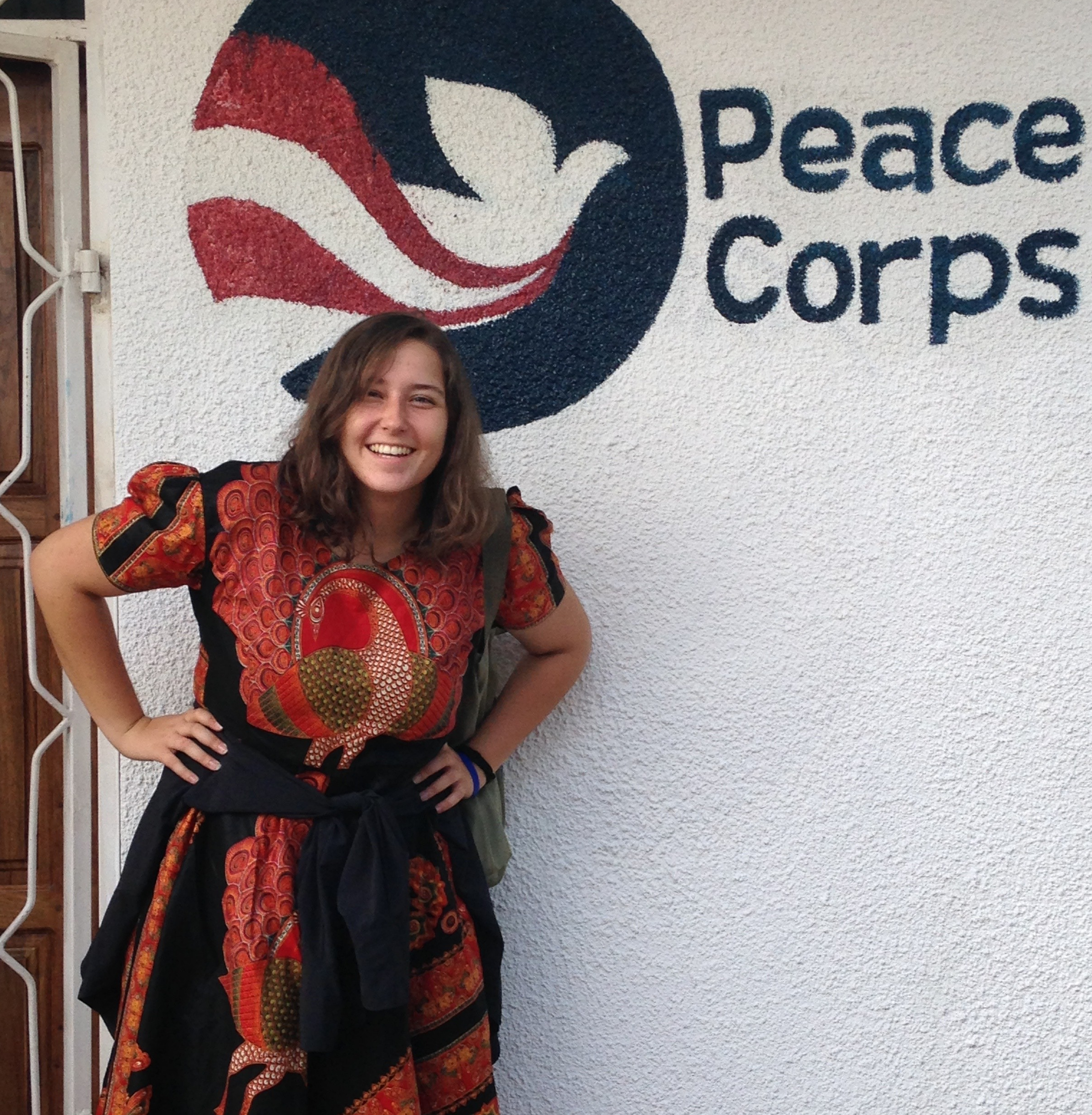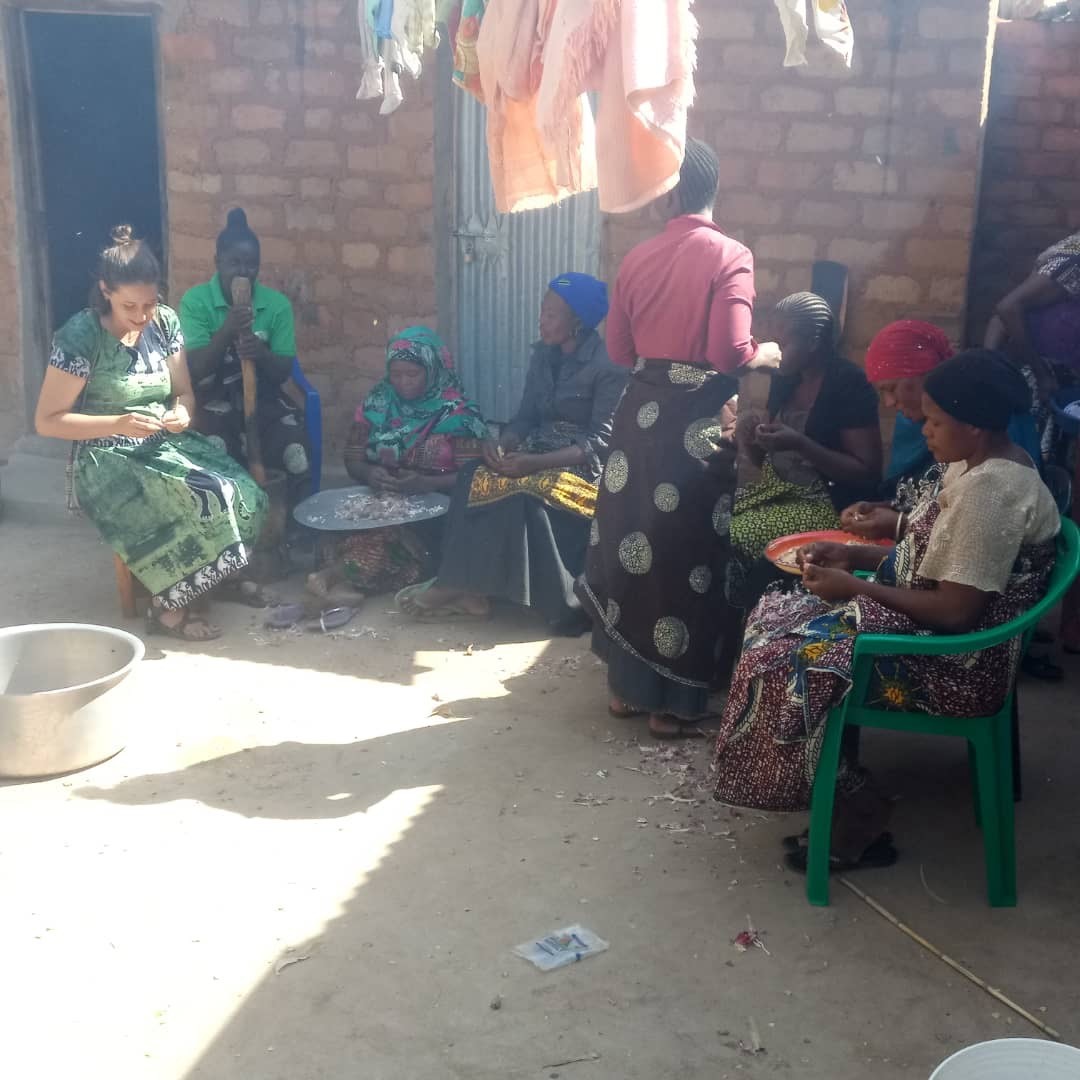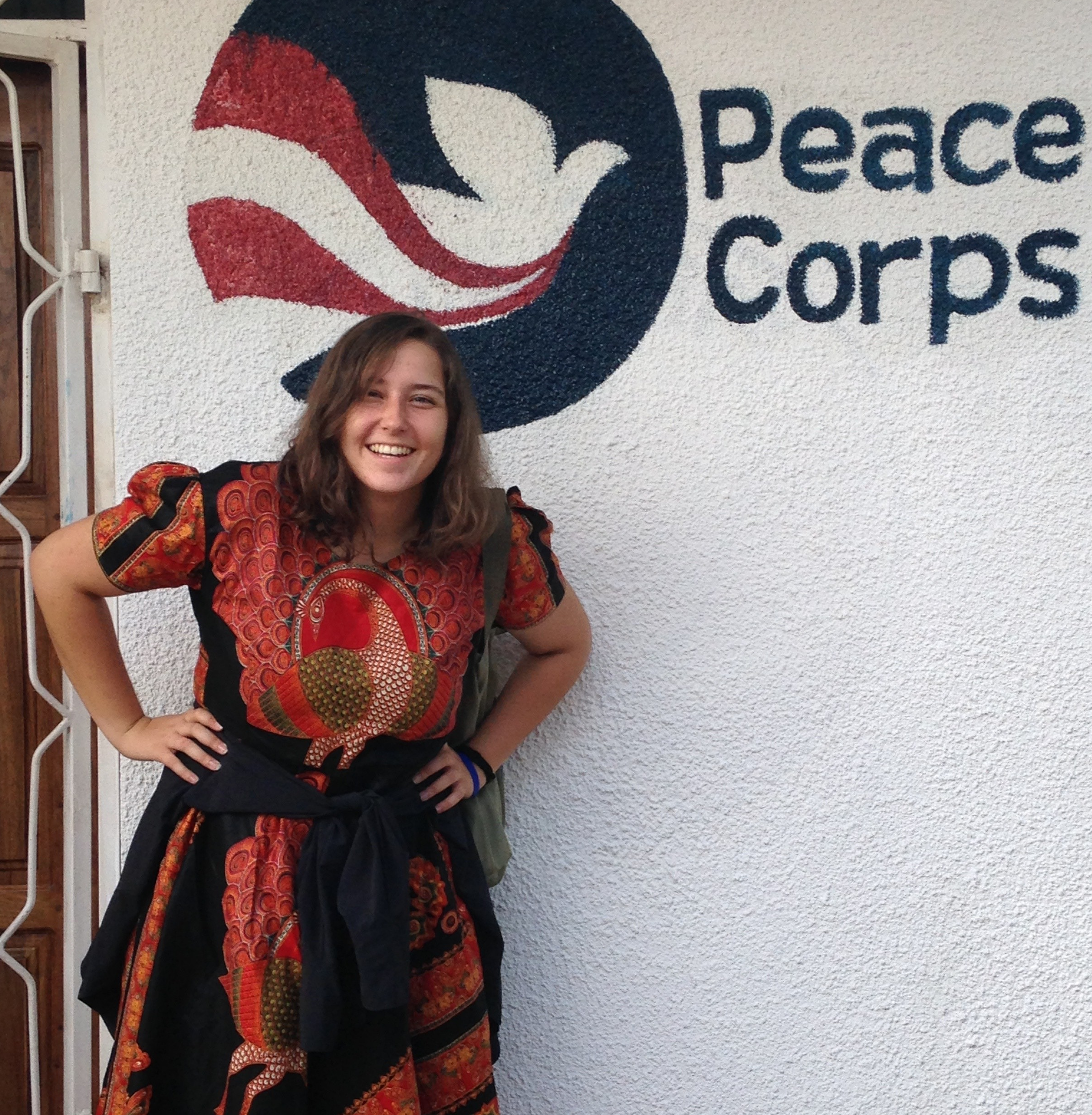 Kenna Dieffenwierth, a 2016 alumna of Saint Leo University, is now lending a helping hand to the world by serving in the Peace Corps in Tanzania. We recently caught up with the 24-year-old native of Jacksonville, Fla. to find out about her experience attending Saint Leo and what she has learned serving in such a unique role since graduating as a biology major.
Kenna Dieffenwierth, a 2016 alumna of Saint Leo University, is now lending a helping hand to the world by serving in the Peace Corps in Tanzania. We recently caught up with the 24-year-old native of Jacksonville, Fla. to find out about her experience attending Saint Leo and what she has learned serving in such a unique role since graduating as a biology major.
1. What high school did you attend?
"I attended Eagle's View Academy."
2. How did you wind up coming to Saint Leo University?
"I was called by a recruiter. I applied, but I was originally planning on going to a school closer to home. I received a better financial aid package and a better feeling about attending Saint Leo. The campus visit and people I encountered made me feel more welcome and at ease."
3. What was your major, and what degree did you attain?
"I was a biology major on the ecology track. I graduated with my bachelor's degree."
4. What are some of your best memories of your time at Saint Leo? Do any favorite professors, classes, or classmates stand out?
"One of my favorite memories is when I was taking one of my final tests before graduating. I was exhausted, burned out, hungry, and the last one in the room still working. Dr. Christopher Miller went and bought me a sandwich. He didn't say anything and I didn't say anything. He just left the room, came back, and handed me a sandwich. He could just tell that I really needed that sandwich. It was a pretty special moment with the awesome human that had been my advisor for three-and-a-half years.
Also, it was beautiful how Professor Linda Bergen-Losee looked after us as lab assistants. She would prepare small bags of treats and handmade cards for holidays and special occasions. She would also invite us into her office to talk over coffee and bagels. She taught mycology. This was one of my favorite classes.
Professor Wilder, Dr. Audrey Shor, Dr. William Ellis, Dr. Thomas Humphries, Dr. Kathryn Duncan, and Professor Carol Moon were others who had a strong impact on my time at Saint Leo. I valued their advice, mentorship, and knowledge. It was special to be able to form relationships with my professors. I don't imagine that would've been possible at a larger university with large class sizes.
Sometimes, I would go with Meli Shuey and CJ (Ciris) Colon to the 24-hour Starbucks in Plant City. We would study all night and wait to claim any 'mistake' drinks. It was really fun working with them in the lab. They were my closest friends in the biology department. They are both hardworking people who inspire me.
One time, Meli and I rented a school kayak and went out in the field to collect data for her senior project. We climbed throughout mangroves, talked, and joked while cutting samples out of trees. I honestly wish I could have gone in the field with her every time. We often joked that our friendship was similar to the friendship between Dr. Miller and Dr. Ellis. She is the Ellis and I'm the Miller.
Some other close friends during my time at Saint Leo were Ashley Reynolds, Leona Hunt, Jessica Miller, Ashley (Ashes), Ale Moreno, Joanna (OJ) Ozog, Craig Graves, Amanda Beil, Courtney Connell, Annie Hayes, and Marie Ryan."
5. Were you involved in any clubs or organizations on campus? If so, what were those experiences like?
"I was in the honors program and loved it. I feel like I learned a great deal and met some of my closest friends through this program. It gave me the opportunity to do interesting work outside of my major. I found each class to be fascinating and fun. The discussions, reading material, and class activities were all brilliant and refreshing.
I was also a member of SEA (Students for Environmental Awareness) and Sigma Tau Delta (the English honors society). Sigma Tau Delta was a lot of fun. I was close friends with most of the members. We had small dances, fundraisers, and events. It was really cool. Sometimes we would go to poetry readings or other events. I was able to join because I was working on my journalism minor and had enough upper-level English credits. In the end, I had to choose between keeping the minor or graduating on time. I chose to drop the minor."
6. Did you live on campus? If so, what was that experience like?
"I lived on campus for my first two years at Saint Leo. Junior year, I moved to East Campus. Senior year, I shared an apartment in Tampa with a couple of friends.
I made amazing friends living in the dorm. Sophomore year was nice because I was living with good friends and we had a kitchen. It was also very convenient to live on school grounds."
7. I understand you have siblings who have also attended Saint Leo?
"Both of my younger siblings attend Saint Leo. William (Jarrett) is 19 and Jacie is 22. Jacie graduated with a degree in business management. She is now continuing her studies at Saint Leo with an MBA with a concentration in marketing. William is in his second year of undergrad as a multimedia management major. They both became familiar with Saint Leo through me. They came to visit me a number of times, applied, and decided it was the place they wanted to attend."
8. What kind of work have you done in your career?
"My first interesting job was when I started working for the Lions' Pride student newspaper as a writer. I was promoted to a copyeditor after one semester. This was one of my favorite working experiences. I was close friends with the other editors and core staff. We had Monday night layout parties where we gathered to put everything together. We worked really well as a group. It inspired me to start that journalism minor I never finished.
I decided to change jobs to work as a lab assistant in the biology department my junior year. This experience helped me to get closer with my professors and to gain experience directly related to my major. As a lab assistant, I became especially close with my friends Meli and Ciris (CJ). We lived in the biology building. Most of our classes were there, we worked there, we often studied there, we sometimes ate there, and napped there. Lewis Hall became like another home.
After graduating, I did odd jobs for about seven months. After being accepted to the Peace Corps, I started working as a substitute teacher until I left the country. I wanted to make sure I really enjoyed teaching before I got on the plane. I've discovered that I really love teaching.
My primary project as a Peace Corps volunteer is teaching, but we can take on secondary projects as well. I've been excited to work on gender empowerment projects at my school. All of my secondary projects have had a gender lens placed on them. I wrote a grant and organized a gender conference with my counterpart. This included 40 students from eight schools in western Tanzania. My counterpart and I also attended a
HURU training and a Grassroots soccer training. We are in the process of implementing these programs at our school. HURU is a program focused on educating girls and boys about reproductive health and life skills. Part of the program is getting "kits" containing reusable menstrual pads to the girls taking part in the program. Many girls miss schooldays during their periods because they don't have pads. The goal is to equip girls with the knowledge and resources to manage their periods and also to address the gender divide and related issues.
Grassroots Soccer is a program that uses soccer and simple activities to teach young people about HIV/AIDS and life skills. There is also a program under Grassroots specifically for girls.
I'm currently on the USAWA committee. It's the committee in Peace Corps Tanzania that works on assisting volunteers and other committees in implementing gender empowerment projects and/or adding a gender component to projects at their sites. Some major projects that our committee organizes include the LEAD Conference and the Safe Schools training.
9. How did you wind up enlisting in the Peace Corps?
"Professor Wilder was a Peace Corps volunteer early in his career. He said that it was one of the best, most rewarding experiences of his life. He told me that I seemed like a 'Peace Corps kind of girl,' and he encouraged me to apply. I worked as his lab assistant for a few semesters. I consider him one of my mentors. My other professors were very supportive as well."
 10. What is your title and role in the Peace Corps? Where have you been stationed? What has the experience been like? What is life like in Tanzania?
10. What is your title and role in the Peace Corps? Where have you been stationed? What has the experience been like? What is life like in Tanzania?
"I am a biology teacher. I teach at a secondary school in Shinyanga, Tanzania. My school is 25 kilometers out of the closest town. I've been living here for a year now, and the experience has been life-changing. I've learned a lot about myself. Life here has been crazy, beautiful, often frustrating, and always full – full of planning conferences, writing grants, teaching amazing students, riding four across in a trunk in an overstuffed van to get to town, listening to hyena calls while falling asleep, eating a giant plate of rice and beans for less than 50 cents, crashing a cross-country family vacation to go see a friend, haggling for everything in the market, playing cards with Form 4 students, and taking pictures of cute baby donkeys. Even when I'm having a difficult time, my students always make it worth it.
Tanzania is a beautiful country. The people have a strong sense of community and are extremely hospitable. My Swahili is still pretty weak, but I get invited to community events like weddings, funerals, and festivals. I drink coffee and eat with people in my community. They look out for me when I need help.
In Peace Corps Tanzania, the volunteer chooses one or more counterparts to work with in their community. My counterpart is like my actual brother, and he is one of the best people I've met. If I'm having a bad day, I can go visit him and talk about anything. He might make me coffee and roast peanuts or even prepare a full meal. (I'm lucky that he is conversational in English.) One time I was having a difficult time and he saw me cry. The next day, he slaughtered and cooked a chicken to cheer me up.
I've had many unexpected experiences here that I don't imagine ever happening in the U.S. For example, a student placed fresh goat entrails in my hand during the school day as a gift for my dog.
The volunteers around me (and a few further away) have become a second family. I've met some amazing people whom I love, trust, and rely on. Many of them are ending their service now as we welcome a new education class. Goodbyes are always difficult."
11. What are your ultimate goals in your career?
"I have discovered a love for teaching. Whatever I do in the future, I want it to be meaningful work that contributes something positive to society."
Photo credit: The photographs included in this blog article were provided by Kenna Dieffenwierth and are used with permission.
#SaintLeoAlumni

 Kenna Dieffenwierth, a 2016 alumna of Saint Leo University, is now lending a helping hand to the world by serving in the
Kenna Dieffenwierth, a 2016 alumna of Saint Leo University, is now lending a helping hand to the world by serving in the  10. What is your title and role in the Peace Corps? Where have you been stationed? What has the experience been like? What is life like in Tanzania?
10. What is your title and role in the Peace Corps? Where have you been stationed? What has the experience been like? What is life like in Tanzania?